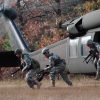calsfoundation@cals.org
Scout from Helena (February 5–7, 1864)
A three-day Civil War scouting mission out of Helena (Phillips County) in early February 1864 resulted in the capture of a Confederate conscripting officer and eleven other men.
Major Eagleton Carmichael led the Fifteenth Illinois Cavalry Regiment out of Helena on February 5, 1864, taking the Little Rock Road for eight miles before switching to the Spring Creek Road, which they followed for eighteen miles before camping for the night at the Dade farm. While en route, they captured Private G. W. Thompson of Colonel Archibald Dobbins’s First Arkansas Cavalry (CS) at W. D. Hutchinson’s farm and Private R. R. Riley of the Twenty-third Arkansas Infantry Regiment “on the road.”
When they reached the Dade farm, they captured Captain Washington L. Martin of the Second Arkansas Infantry (CS), who was on detached duty as a conscripting officer, and four privates of his company in addition to A. G. Jarman, who, Carmichael said, “met Martin there with the expectation of being conscripted.” He added: “I believe he is a disloyal man and if he is not kept as a soldier—he might be kept as a hostage for Mr. Hobbs.” The latter referred to A. Hobbs, a pre-war manager on John Williams’s farm near Old Town (Phillips County). Hobbs’s son James, a Union soldier stationed at Fort Pinney in Phillips County, wrote that, on February 2, 1864, “our Father was taken from us by [Lieutenant] Thomas Casteel and he has not been heard from since a live [sic].”
The next day, the Federals rode to within two miles of Moro (Lee County) before turning away, “having ascertained that there was no enemy in the vicinity of Moro,” and riding to Colonel Slaughter’s farm, where they camped. They had captured a private of Dobbins’s regiment, an irregular soldier from Casteel’s company, and another of Martin’s conscripts during the day.
Heading out at daylight on February 7, they “made a large circuit northeast” of the Spring Creek Road before Carmichael sent a squad to Big Creek “to ascertain if it were possible to cross.” That detachment captured another private from Dobbins’s regiment. The Illinois horsemen then returned to Helena, with Carmichael reporting that “we captured one captain and eleven men—Eleven horses and one mule—(all poor stock)—two Revolvers and a number of shot-guns which we destroyed.”
Casteel apparently killed the captured man, A. Hobbs. His son James wrote to Brigadier General Napoleon B. Buford on June 21, 1864, that “you can imagine my feelings today as I was riding by the lonely spot where the remains of my dear Father lies; where to ev[er]y appearance indicated cold blooded murder.” The younger Hobbs urged Buford to prosecute Casteel, who had been captured in the April 1864 expedition from Helena to Mississippi and Laconia (Desha County), for his father’s murder.
The February 5–7, 1864, scout from Helena was typical of the frequent cavalry forays from the Union base in search of Confederate soldiers and guerrillas operating in the area.
For additional information:
Carmichael, Maj. to Capt. T. C. Meatyard, February 8, 1864. National Archives and Records Administration, Records of Named Departments, 393P2E299, Box 1.
U.S. Civil War Service Records—Confederate—Miscellaneous, 1861–1865, Roll 66.
Mark K. Christ
Little Rock, Arkansas
 Civil War Timeline
Civil War Timeline Military
Military



Comments
No comments on this entry yet.